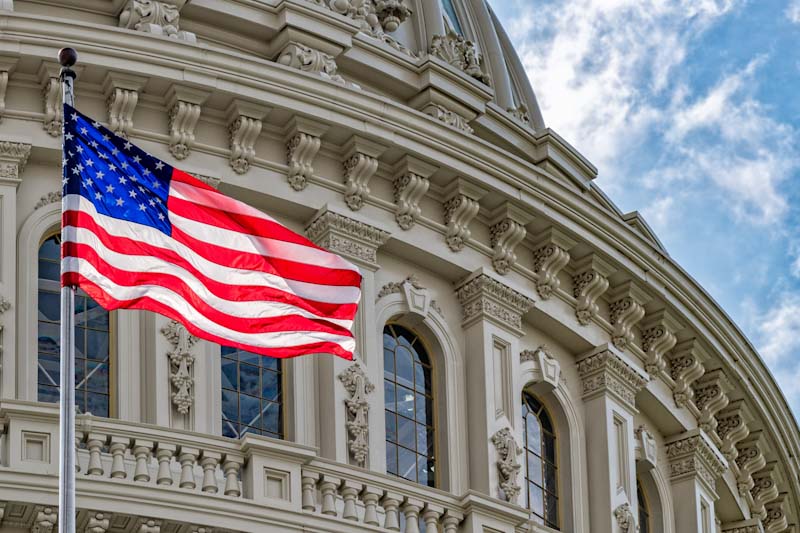This website uses cookies so that we can provide you with the best user experience possible. Cookie information is stored in your browser and performs functions such as recognising you when you return to our website and helping our team to understand which sections of the website you find most interesting and useful.
News
Legislative Update: Recycling Legislation Update and USMCA Passage
Recycling
There has been significant movement on some of the many recycling bills in Congress. The Senate amended and passed S. 1982, the Save our Seas 2.0 (SOS 2.0) Act by voice vote on Jan. 13. The bill sponsored by Senators Dan Sullivan (R-AK), Sheldon Whitehouse (D-RI), and Bob Menendez (D-NJ) takes aim against plastic pollution. The bipartisan legislation has the support of the American Chemistry Council and the Plastics Industry Association while some environmental groups feel the legislation does not go far enough. The bill is a multi-pronged piece of legislation introduced collectively as S. 1982, but also introduced in three standalone bills S. 2260, S. 2372, and S. 2364. The measure improves domestic infrastructure through a state revolving loan fund and a new grant program for drinking water infrastructure, wastewater infrastructure, and trash-free waters. The bill also enhances global engagement on combating marine debris. Rep. Suzanne Bonamici (D-OR) introduced a House companion bill (H.R. 3969) in July 2019 which currently has 31 cosponsors including five Republicans but has not seen any movement in committees since introduction.
Sen. Tom Udall (D-NM) and Rep. Alan Lowenthal (D-CA) released a revised draft of their recycling proposal after receiving over 200 individuals, businesses, trade associations, environmental groups, state & local governments, academics, and other organizations submitted comments. The Senators originally released their draft proposal in July 2019, inviting input from stakeholders for the past six months. Their draft legislation works to reduce plastic waste by phasing out certain single-use plastic products and extending responsibility on producers by requiring them to design, manage, and finance programs for end-of-life management of their products and packaging as a condition of sale. The bill also requires a national container deposit law and a collection target for single-use plastic bottles in hopes that to create incentives to shift to more sustainable products. The fees would be redistributed to states and affected communities for investments in waste minimization, pollution reduction, recycling, safe disposal, and innovation research. While a wide range of environmental groups favors the legislation, the Vinyl Institute (VI) and several industry groups are concerned with unintended consequences of singling out one material.
The VI is troubled with many of the new provisions including the seemingly contradictory notion of requiring the plastic industry to do more recycling while simultaneously disallowing the most advanced forms of plastic recycling. The VI is also troubled by a provision that requires a temporary pause during which no new source permits can be issued by the Environmental Protection Agency (EPA) Administrator and no exports of the covered plastics which include polyethylene, polypropylene, vinyl chloride, PVC. The proposed legislation also rewrites many of the statutory requirements under the Clean Air Act, the Clean Water Act, and the Resources Conservation and Recovery Act in a manner that would harm the plastics industry. The VI will further evaluate the new language and provide a more detailed analysis.
USMCA
The Senate overwhelmingly approved the United States-Canada-Mexico Agreement (USMCA) on Jan. 16 in a bipartisan vote of 89-10. The deal’s Democratic opponents were Sens. Cory Booker (NJ), Kamala Harris (CA), Kirsten Gillibrand (NY), Ed Markey (MA), Jack Reed (RI), Brian Schatz (HI), Chuck Schumer (NY), and Sheldon Whitehouse (RI). Presidential candidate Sen. Bernie Sanders (VT) voted no, and Sen. Pat Toomey (PA) was the lone Republican to vote against the pact, while Jim Inhofe (R-OK) did not vote.
Days after the vote, Mexican Subsecretary for Foreign Trade Luz María de la Mora met with U.S. counterparts in Washington, DC, to begin planning for the implementation of the USMCA. De la Mora said the officials are aiming for a July 1st entry-into-force-date. The President is expected to sign the USMCA bill after he returns from Davos on Friday.
U.S. – China Trade Negotiations
The President scored another trade win by signing the U.S. and China “Phase One” trade agreement in a ceremony Jan. 15. As part of the agreement, China committed to purchasing $200 billion more in U.S. goods and services over calendar years 2020 and 2021. The text of the deal shows that part of that $200 billion is calculated using China’s 2017 purchases of agriculture, energy, and manufactured and goods as the base. The U.S. agreed to cut tariffs on $120 billion worth of imports from China, while maintaining 25 percent tariffs on approximately $250 billion of Chinese imports and reduce to 7.5 percent tariffs on about another $120 billion of imports in 30 days. The agreement also includes a series of commitments aimed at limiting sanitary and phytosanitary trade barriers; a pledge to confiscate and destroy counterfeit products; a promise to ensure U.S. market access for goods other countries protect as geographical indications; and a requirement that internet service providers adopt notice-and-takedown procedures.
President Trump said the remaining U.S. tariffs on Chinese goods would serve as leverage for the U.S. in future negotiations. The President said the next round of “Phase Two” talks on the remaining trade issues would begin “very shortly.” If the “Phase Two” talks lead to a deal, Trump said he would remove all tariffs on Chinese goods.


